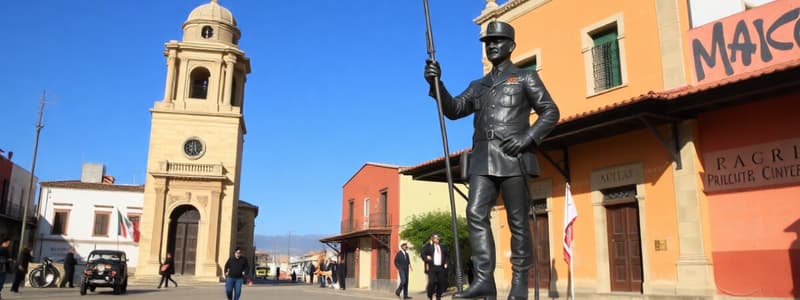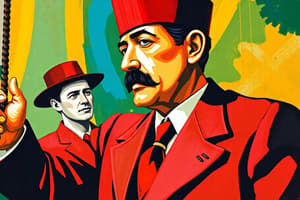Podcast
Questions and Answers
In what year did Plutarco Elias Calles become president of Mexico?
In what year did Plutarco Elias Calles become president of Mexico?
- 1917
- 1910
- 1924 (correct)
- 1934
What was Calles's reputation among conservative elements in Mexico?
What was Calles's reputation among conservative elements in Mexico?
- A radical (correct)
- A moderate reformer
- A cautious diplomat
- A strong supporter of the church
Which group did Calles NOT alienate with his policies?
Which group did Calles NOT alienate with his policies?
- The military (correct)
- Industrialists
- Church leaders
- Landowners
What was the name of the labor organization favored by Calles?
What was the name of the labor organization favored by Calles?
What type of projects were introduced during Calles's presidency?
What type of projects were introduced during Calles's presidency?
Flashcards
Calles' Labor Policy
Calles' Labor Policy
President Calles' labor policy favored Luis Morones and the CROM to expand political support. Morones became Secretary of Labor and Calles' confidant quickly.
Calles' Education Initiatives
Calles' Education Initiatives
Calles aimed to acculturate indigenous populations through Spanish education and promoting Mexican nationalism, sometimes seen as assaults on local autonomy and culture.
Calles' Sanitation Program
Calles' Sanitation Program
Calles initiated sanitation programs, establishing codes for markets and milk, plus vaccinations. Regular inspections of businesses ensured standards were met, and owners were fined for failure to comply.
Sheffield vs. Calles
Sheffield vs. Calles
Signup and view all the flashcards
Resolution of Cristero Rebellion
Resolution of Cristero Rebellion
Signup and view all the flashcards
Study Notes
- General Plutarco Elías Calles held power in Mexico for a full decade starting in 1924.
- Calles was born in Guaymas, Sonora, in 1877, to a family with declining fortunes.
- Calles attended normal school in Hermosillo, excelled in the classroom, and became a primary school teacher.
- Calles's political career started with the revolution, serving in minor political and military roles.
- In 1917, Calles became the provisional governor of his home state.
- Calles secured official endorsement for the presidency in 1924 because of his loyal support for Obregón over ten years.
- He won the election easily with backing from labor and agrarian sectors.
Calles's Domestic Program
- Conservative elements in Mexico were not pleased with Calles's win because he had a radical reputation.
- Landowners, both domestic and foreign, were concerned about potential property loss.
- Industrialists anticipated increased wages for their workers.
- Church leaders viewed the new president as a confirmed anticleric.
- Calles's domestic policy was not typified by the compromise and caution of his predecessor.
- Calles was willing to ride the swelling wave of social revolution.
- Calles believed that the course of social revolution was inevitable.
- Calles was considered the most strong-willed president since Díaz and he greatly trusted his political instinct.
- Calles was outspoken and eloquent and unbothered by morals when dealing with enemies.
- Calles became increasingly focused on controlling revolutionary factions as the years went on.
- Calles depended on the army to dispatch government opponents.
- Jails began to fill with political prisoners and there were alarming numbers of "committed suicides."
- Calles inherited a better financial situation than Obregón and improved it by creating the Banco de México, introducing tax reforms, and lowering public debt.
- Infrastructural projects such as rural electrification and road construction were carried out.
- To gain popular support among workers and campesinos, Calles more than doubled the amount of land distributed by Obregón.
- The majority of these 8 million acres became communal ejidos.
- Irrigation projects were started to improve productivity and new agricultural schools were founded.
- Agricultural credit began to be extended to the small farmer.
- Some Zapatistas in Morelos experienced benefits from these changes.
- Maya campesinos of the Caste War were lured into the national family when many rebellious villages accepted land titles from the government.
- He appointed Luis Morones, as secretary of labor, and Morones immediately became Calles's closest confidant.
- Other highly ranked CROM officials held state governorships, served in Congress, and in state legislatures.
- CROM united hundreds of independent unions under its organization and established numerous new unions.
- CROM's membership hit 1.8 million by 1928.
- The parent organization had affiliates in most states, its support of the government was blatant, and its influence became pervasive.
- The confederation even stopped printers from typesetting anti-Calles publications.
- Calles helped CROM against employees and other unions, namely communist unions and Calles suppressed a strike by communist railway workers in 1926.
- El Machete and El Libertador backed communist recruitment in Mexico.
- Wages rose approximately 30%.
- By 1928, several labor leaders were worried about Morones, who was believed to have acquired rings, vast holdings in urban real estate, and new automobiles through tax evasion and union funds.
- Calles inherited foundations for nation-building from Obregón and Vasconcelos in the area of education.
- Around 1,000 federally supported rural schools were in operation in 1924.
- Calles and his secretaries of education, José Manuel Puig Casauranc and Moises Sáenz, emphasized rural education and added 2,000 rural schools.
- To make it easier to acculturate the Indian population, there was a heavy emphasis on teaching Spanish and promoting nationalism.
- The muralist movement went on, serving as an educational tool for non-literate masses intended to teach Mexican history.
- Sanitation conditions improved following the revolution because they created a health and sanitation program.
- The recently established Department of Public Health oversaw a sanitary code for ensuring cleaner markets and purer milk.
- The government carried out large vaccination campaigns for the first time in Mexican history, inoculating approximately 5 Mexicans against smallpox in 1926.
- Regular inspections began under the Calles administration at butcher shops, dairies, bakeries, barber shops, and cantinas.
- Establishments that did not meet prescribed sanitary regulations were fined and closed down.
Relations with the United States
- Relations with the United States remained centered on oil.
- US Ambassador James Sheffield continued to sought assurance that foreign property interests would be protected.
- Sheffield bombarded the U.S. State Department with red-scare dispatches when Calles refused to go beyond earlier promises.
- The Mexican and Bolshevik revolutions troubled US observers.
- Secretary of State Frank B. Kellogg believed a Bolshevik plot was about to divest US citizens of property as convinced by Sheffield.
- In mid-1925 Secretary Kellogg released a statement arguing Mexico was on trial before the world.
- The Mexican government rejected the threat to Mexico's sovereignty.
- Calles directed the legislature to enact a new petroleum law in December 1925.
- The legislation would decide whether or not to grant confirmations, Mexico would apply the doctrine of "positive acts", and concessions would be granted only for fifty years.
- Relations worsened between Mexico City and Washington when Calles began to enforce the new petroleum law.
- President Calvin Coolidge replaced Ambassador Sheffield with Dwight Morrow in 1927.
- Morrow and Calles began having breakfast to work on the sticky diplomatic problems.
- Morrow did not believe Mexico was on trial before the world when the oil controversy came up.
- Morrow told Calles that the issue should be settled in Mexican courts and they would not give US citizens special consideration.
- The Supreme Court ruled that oil companies would apply for new concessions.
- Washington formally recognized Mexico's full legal sovereignty for the first time.
The Cristero Rebellion and the Assassination of Obregón
- Calles's most serious problem was with the Roman Catholic Church.
- Calles decided to enforce anticlerical articles of constitutions
- Tensions escalated between government and church after an interview with José Mora y del Río in February 1926.
- The archbishop reasoned that Roman Catholics could not accept the constitution.
- Calles banned religious processions before deporting nuns and priests and closing church schools, convents, and monasteries.
- Also, Calles decreed priests must register with civil authorities, which caused the archbishop to strike July 31, 1926.
- The strike lasted for three years.
- Calles's criticisms of the clergy and pope grew even more obscene.
- Groups from Jalisco began to resist the government under Anacleto González Flores, Rene Capistran Garza, and Enrique Gorostieta and would cry "¡Viva Cristo Rey!".
- Catholic guerrillas would murder teachers and burn schools.
- Government troops would encourage children to throw stained glass and loot churches.
- The military superiority would soon beat the rebellion down.
- During the conflict, many Catholics fled to the United States to raise money and propaganda against Calles.
- The constitution had recently been amended to allow reelection as for Obregón, but did not win again since he was soon assassinated.
- Two other opposition candidates rose up wanting to rebel against the government, but were both captured and executed shortly after.
- José de León Toral assassinated Obregón where he drew caricatures and went up to the head table July 17, 1928.
- The assassin refused to answer any questions unless they threatened his family.
- Toral's religious beliefs led him to mysticism by the time of the Cristero Rebellion.
- Sister Concepción Acevedo de la Llata guided and consulted him.
- Toral, in early July, would practice with a pistol borrowed from one of Conutita's friend.
- Finally, Conchinta and other's were arrested following Toral's confession.
- Toral got the death sentence, and Madre Conchita received a prison sentence of 20 years.
The Maximato and the Shift to the Right
- Only Calles had commanded sufficient respect to fill Obregón's asassination.
- Calles continued to control the nation's destiny as the power behind the scenes.
- Calles installed Emilio Portes Gil, Emilio would wind up being being the first of three Obregon's term.
- Calles shot the shots, and united revolutionary factions into the PNR or the Partido Nacional Revolucionario.
- The PNR would "style" their party myth around the father figure who came along with it.
- With special election occuring for election, they came up with Pascual Ortiz Rubio for president.
- Wasconcelos' election campaigns would rather be placed on Calles rather than Ortiz in terms of the campaign.
- Wasconcelos had won by the very unbelievable margine of 1,948,848 to 110,979 in the results.
- Before he had opposed to Calles, he picked up a morning newspaper saying he resigned.
- On this occasion, Jefe Maximo picked General Abelardo Rodríguez, who'd benefited from the situation in Baja California.
- Despite the musical chairs, the years from 1928-34 helped with depoliticizing the amry.
- Given the military voice, anti-government revolutions were reduced.
Reconciling the Church
- Ambassador Morrow oversaw meetings for the reconcilliation between the Catholic population.
- Catholic bishops would return to their positions.
- The Mexican leaders agreed that the exiled would be able make it back to their churches.
- The CATHOLIC bishops would have to register with the new government.
- The government has agreed that those churches wouldn't be prohibited.
- The Cristero would soon turn their guns in to restore the Religious services.
- Also, revolutionary pricinciples had become questionable in the movement.
The Great Depression
- The economy, stagnated ,shifted Right.
- 500,000 Mexican Americans ,were upauiaced by the U.S.'s government
- Governments had revenue drop by 25%.
- These new "millionaire socialists" capitalized on the country that had all happened.
- The Torres familys got land back from what Obregon had enforced them to sell in presidoeny.
- Luis turned into his excessed where corruptuin would then be prevalent.
Studying That Suits You
Use AI to generate personalized quizzes and flashcards to suit your learning preferences.




